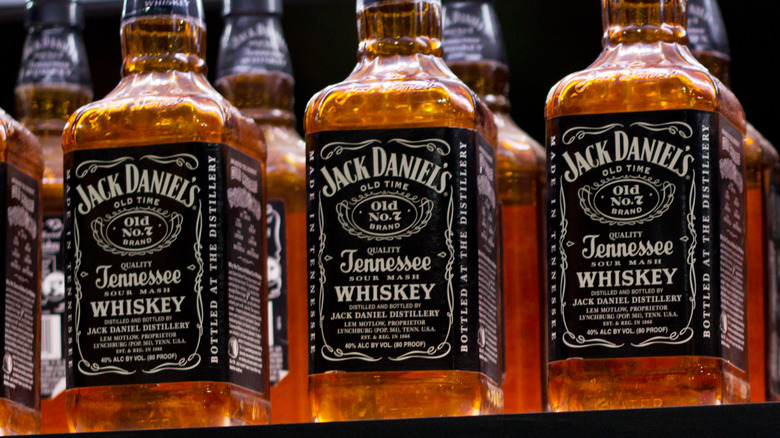The U.S. Supreme Court Has Reached A Verdict On The Jack Daniel's Dog Toy Debacle
While cocktail hour might be frivolous, a questionable dog toy parody is no laughing matter. CNN.com reported that Jack Daniels prevailed over VIP Products in a trademark infringement case heard before the U.S. Supreme Court.
The litigation stemmed from VIP Products Bad Spaniels dog toy that used similar imagery as seen on a Jack Daniels bottle. The Brown-Forman liquor brand sought to prohibit the dog toy's sale since consumers could be confused, assuming that the questionable dog toy was directly affiliated with its brand. VIP Products believed its squeaky toy was a parody falling under a creative expressive work label.
According to the "narrow" ruling by Justice Elena Kagan, the issue was decided on the basis of whether or not the Bad Spaniels caused consumer confusion. Regardless of the packaging disclaimer, it was the reference to Jack Daniel's protected imagery. Trademark law seeks to protect both the producer's goodwill and the consumer's choice. When an item inhibits those two aspects, it can create consumer confusion. This decision was about the Jack Daniel's mark and only the mark.
Whether it is a specific color, a font, or a combination of those items, the mark is the measurement. The ruling focuses on the idea that the trademark tells the consumer its origin. In this case, Jack Daniels and its old No. 7 should never be confused with a dog's number 2. This ruling ensures that it will not happen again.
Could the Jack Daniels' ruling create more trademark litigation?
While Jack Daniels might be toasting to its legal victory over VIP Products and its parody dog toy, the ruling has many companies wondering about trademark litigation. Although brands work diligently to create and protect their signature mark, that recognition can come at a cost. Parody might elicit a humorous response, but for businesses, it might not be a laughing matter.
Bloomberg's legal news article asserted that this U.S. Supreme Court decision could make it easier to sue an offending parody. The majority opinion referenced that parody's source identification hopes to use the original product's goodwill and reputation to foster their own sales or benefit. While people might chuckle at the wording, free expression only happens because it relies on the underlying source, the mark, which could have a negative impact on the original brand.
This topic has been and will continue to be debated. The line between not liking a joke and causing business interference is difficult to understand. Using a source identifier in an expressive way can be permissible, like a social media meme where a particular beverage brand comments on a person's sophisticated taste. But, if a new beverage brand used the same font, color, and wording to launch a concept associated with a competing business, it could cause consumer confusion. In the end, being a recognizable brand is the goal, but it may have high costs associated with it.

